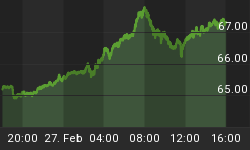If you work around or trade the financial markets, it is impossible to insulate yourself from the never-ending use of the term bubble. Barron's, a respected and widely read financial publication, has featured the word bubble on its cover twice in the past two years.

Barry Ritholtz, the author of "Bailout Nation", recently pointed out the historical significance of magazine covers and major stock market peaks. From Bloomberg:
In any historical asset bubble, we do not get bubble magazine covers in major news media at the height of the bubble. If anything, it's the precise opposite. A positive story on gold on the cover on New York Times Magazine in 2011 -- and GLD passing SPY as the biggest ETF -- marked the top. Perhaps the most infamous was the June 2005 Time Magazine cover on "Why We Love Housing."
The Death of Equities

As we outlined in detail on November 12, the present day facts do not support the "euphoric, everyone is in stocks" case, which aligns with the magazine cover thesis. Looking a little farther back in history, BusinessWeek declared the "Death of Equities" in a 1979 cover story.
As shown in the chart of the S&P 500 below, the report of the demise of equities was not only premature, but stocks exceeded all expectations by soaring over the next two decades.

One of the key takeaways is when bubbles typically pop, talk of bubbles is almost nonexistent since market participants have become convinced that "stocks cannot go down" or "real estate always goes up". In 1998, a Time magazine cover asked if the boom in stocks was over.

As you might have guessed, the answer to Time's question was "no, the boom is not over" as equities marched higher as more and more money came off the sidelines (see chart below).

Investors Are Too Complacent, Right?
Another common reason cited to be bearish on stocks is the "sign of complacency" evident in a low Volatility Index (VIX) reading. While there is no question some complacency has crept into the markets as stocks have pushed higher over the past several weeks, a VIX below 15 is not a showstopper for stocks. The concepts below, as well as other often-cited showstoppers, are described in this video clip.

Investment Implications - Markets Will Guide Us
Using the magazine covers as a contrary and bullish indicator, should we calmly remain fully invested in stocks? No, we should continue to monitor the message being delivered by the market's pricing mechanism with a flexible and open mind. Mr. Ritholtz summarizes the significance of all the talk of bubbles via Bloomberg:
I am hard-pressed to recall when any sort of bubble was accurately identified in real time on the cover of a major media publication. If anything, the opposite is true. All of the skeptical bubble talk -- and there has been lots -- seems to be a contrarian indicator that this long-in-the-tooth, overpriced market might still have a ways to go.
Gains For Six Weeks
As of Tuesday, the message from the market's pricing mechanism continues to support a "risk-on" investment stance. Consequently, we will continue to hold our stake in U.S. stocks (SPY), technology (QQQ), financials (XLF), energy (XLE), foreign stocks (VEU), and emerging markets (EEM). Stocks have posted gains for six weeks, which means we have to be open to a period of healthy consolidation even under bullish scenarios.















